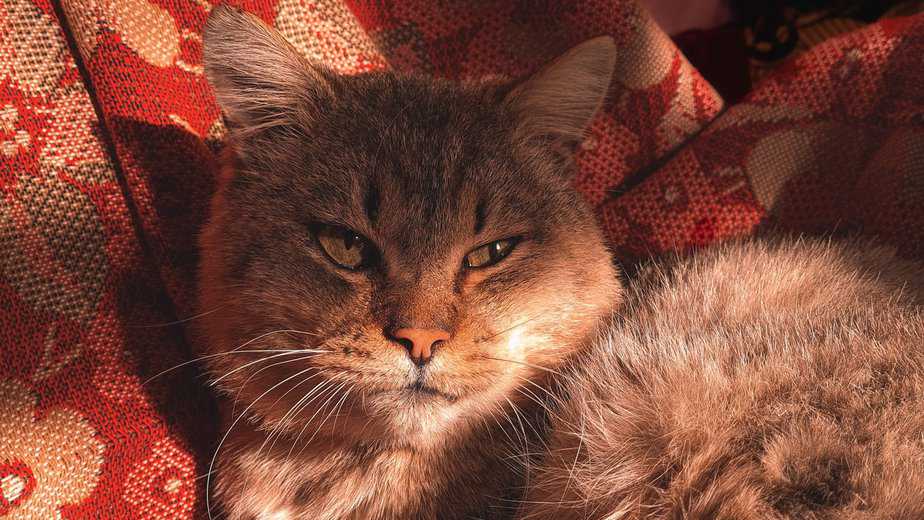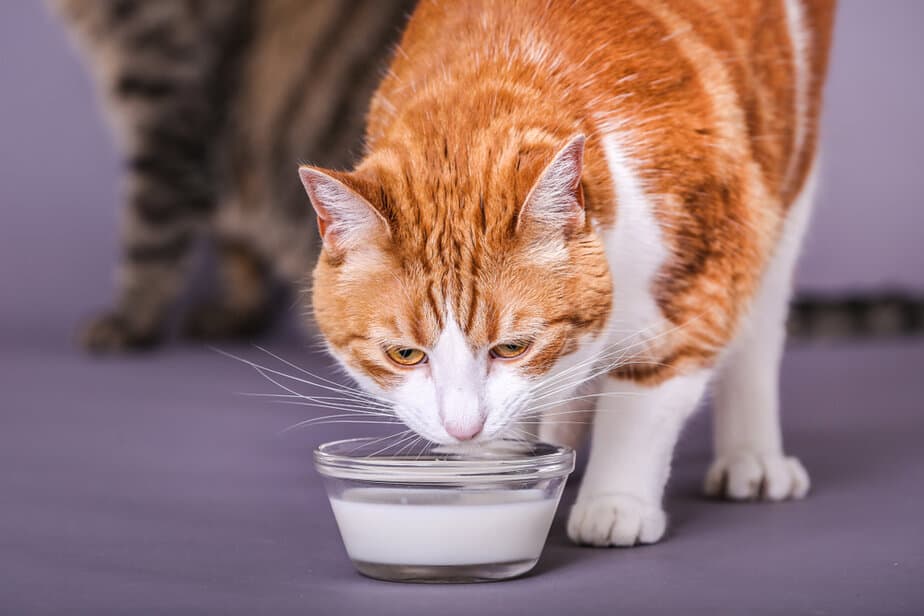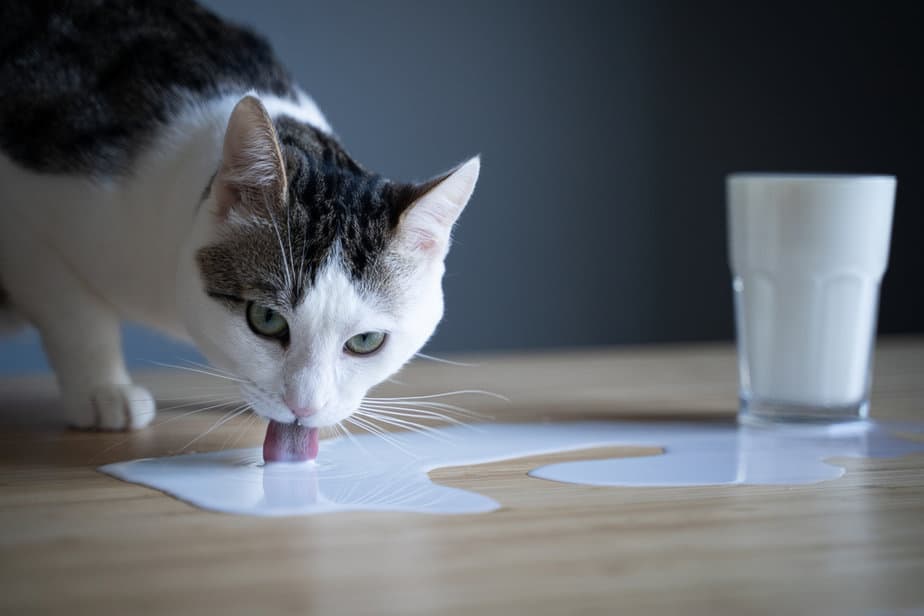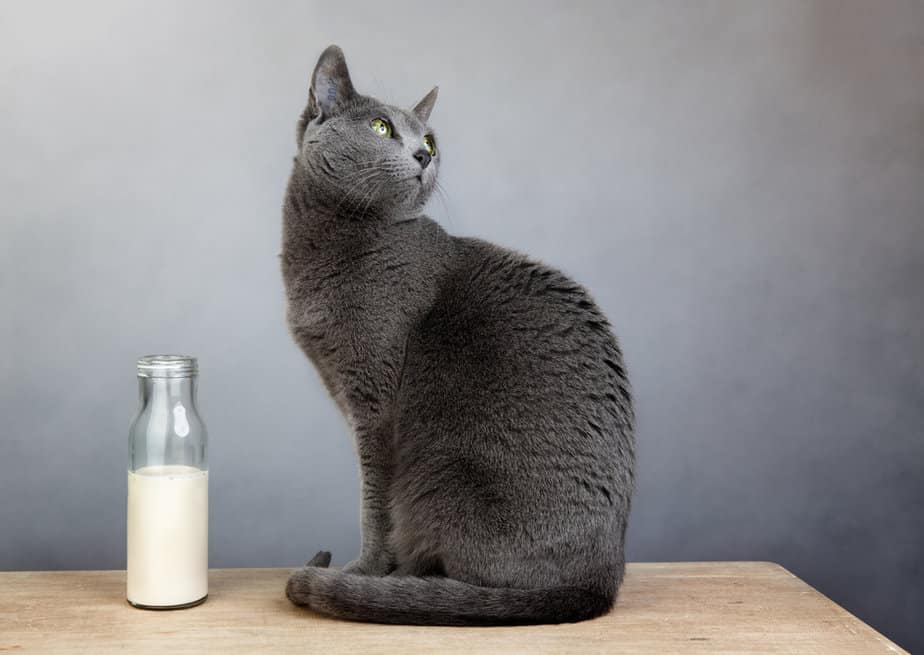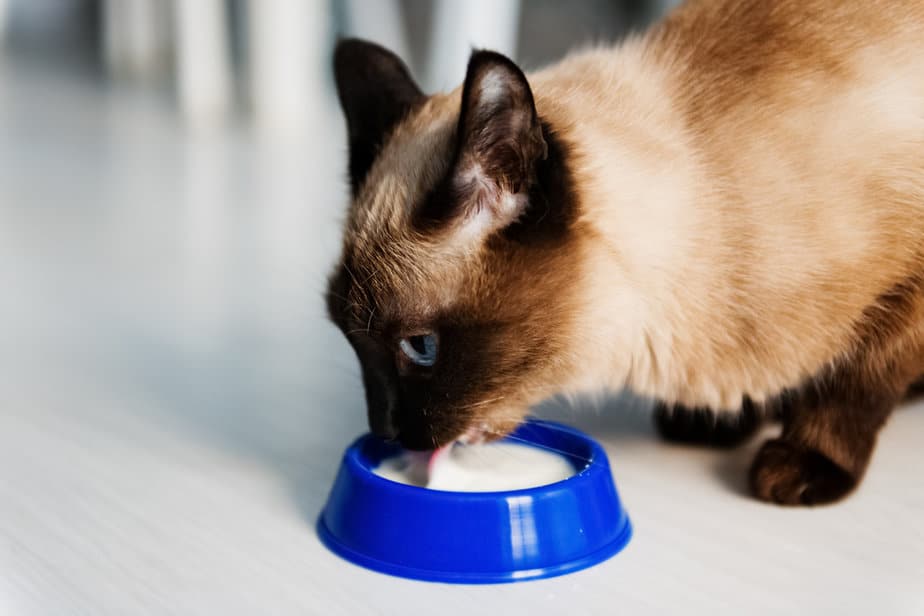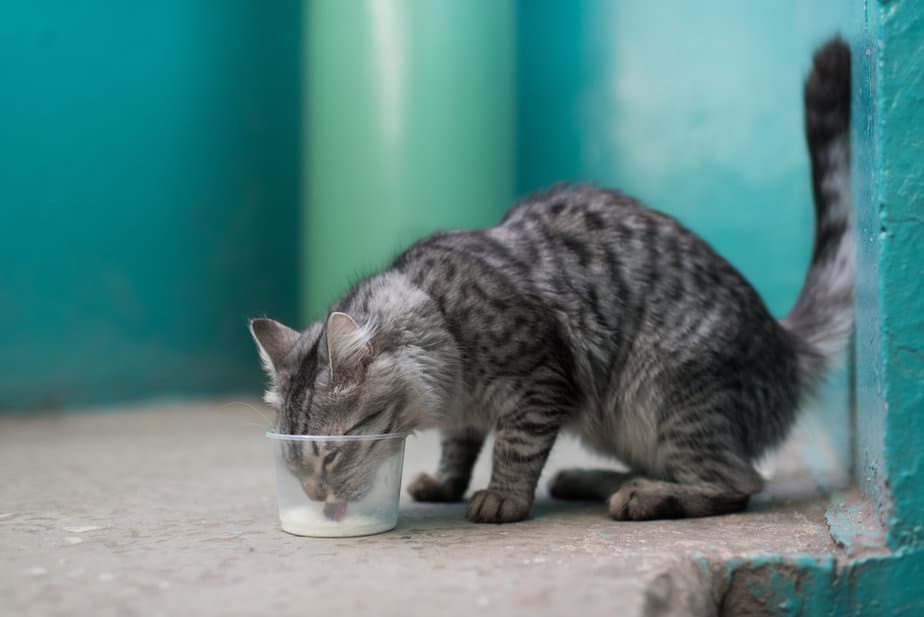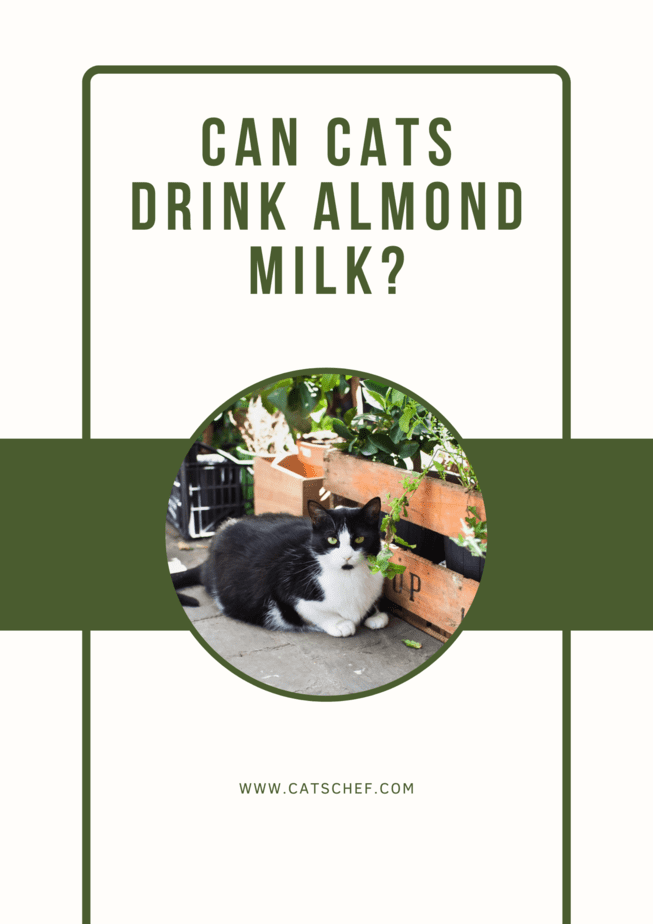📖 Table of Content:
Trust me, you don’t know what you’re missing out on until you take a sip of a Starbucks almond milk latte! And, you don’t know what you’re missing out on until you feel those hard-to-resist munchkin eyes on you while you’re trying to savor your drink. Coffee aside, can cats drink almond milk?!
Your cat certainly wants to! She’s been meowing and purring your ears off every time she’s seen you drinking anything REMOTELY similar to milk. She probably doesn’t even know the difference between regular (cow, obviously!) milk, almond milk, and other lactose and dairy-free kinds of milk.
What an adorable furry fool! But, you’re starting to think you won’t be able to keep up with this whole “strict pet parent” thing. You won’t be able to keep telling her “NO” whenever she gives you the look. She’ll try to convince you to let her have a lick.
“Argh, can cats drink almond milk?!” Our friends over at the ASPCA (American Society for the Prevention of Cruelty to Animals) don’t seem to have anything against feeding your cat almonds or letting them have a lick or two of almond milk.
Before the two of your head off to Trader Joe’s to get the largest gallon of almond milk they have, you might want to consider a thing or two. Almond milk might be RELATIVELY safe for your curious creature, but that’s not to say that this kind of milk’s rainbows and butterflies.
What’s the deal with almond milk?
“So, how do humans milk almonds?” Let’s be honest, every single person reading this article has (at one point) thought to themselves “How do we even make almond milk? Do we milk the almonds or?”
And, that’s completely fine because we’ve only recently stumbled upon this trend of lactose and dairy-free milk. So, almond milk became popular because it’s creamy, nutty, lactose-free, dairy-free, cholesterol-free, and saturated-fat-free milk. Who wouldn’t want to start their health kick with something like that?
Almond milk’s made of almonds (obviously), and the process seems very simple. You can make your own milk with a cup of almonds, some water, and a high-power blender. Soak the almonds overnight, cover them with water, and throw them in the blender until they’re nice and smooth.
Get rid of the pulp and you’re ready to have a glass of your DIY almond milk! Commercial almond milk, however, does contain a bunch of sweeteners, flavorings, additives, and preservatives to make up for the fact that you’re drinking milk straight out of an almond’s udder!
And don’t worry, you won’t be missing out on any nutrients because almond milk’s beaming with vitamins, minerals, and a little bit of plant protein. However, the age-old question remains, can cats drink almond milk without the repercussions?
Can cats drink almond milk?
Cats can drink almond milk, KIND OF! Sure, a lick or two isn’t going to send your feline friend to the emergency animal center. But, anything more than that might not be the best she’s ever had.
You see, cats are carnivores which means they thrive on meat, animal protein, and other animal nutrients. They don’t need to eat fruits, veggies, and whole grains to stay happy and healthy. They don’t even possess the enzymes necessary to break down and process most foods humans eat on a regular.
What does that mean for this whole “Can cats drink almond milk?” thing? Since cats have VERY specific nutritional needs, their digestive systems are equipped with enzymes necessary to fit those needs.
Cats don’t really need milk once they grow out of drinking their mother’s milk. Therefore, their digestive systems don’t have what it takes to digest any other kind of milk. Yes, that’s right – cats are pretty much lactose intolerant and they shouldn’t drink milk AT ALL.
But, almond milk happens to be lactose-free which means she’s free to have an occasional lick or two. It shouldn’t be a regular part of her diet, but that’s not to say that almond milk doesn’t bring anything good to the table.
What’s good about almond milk?
Your curious creature can’t help but perk up her ears whenever she hears you open the fridge, or scrunch up her nose whenever she catches a whiff of milk. “She can’t drink milk because she’s lactose-intolerant!” a voice in your head reminds you why you shouldn’t capitulate.
“But, look at that adorable face… How can her own pet parent be the monster that refuses her wishes!?” Put that smile back on your face (and on your precious purrincess’s face) because almond milk’s a great alternative to regular milk.
Almond milk’s lactose-free, dairy-free, cholesterol-free, AND saturated-fat-free! It also seems to be barren of everything that makes regular milk bad for your four-legged friend.
What do we mean by that? One of the biggest problems with regular milk happens to be the fact that it can cause a bunch of digestive problems, weight gain, obesity, and diabetes. Almond milk doesn’t contain the things that cause these conditions, and naturally, seems like a better choice.
And (as if we needed any more convincing), almond milk’s beaming with vitamins, minerals, and antioxidants. We’re talking about vitamin E, vitamin D, calcium, magnesium, and potassium. These can boost your cat’s immune system before you can even say “ahchoo.”
Apart from that, commercially available almond milk can contain other vitamins and minerals. These are usually added to enrich the content. But, it also comes with a couple of risks you should keep an eye out for.
What’s bad about almond milk?
Cats CAN drink almond milk, but that doesn’t necessarily mean that they should. We wouldn’t say almond milk’s a natural part of a cat’s diet. Wild cats would be caught dead drinking almond milk straight from the almond’s udder (yes, we’re dragging this joke).
And, your not-so-wild cat wouldn’t want to drink almond milk had she been informed that almond milk doesn’t bring THAT many benefits to her table. Sure, almond milk’s beaming with vitamins, minerals, and antioxidants AND lacking in the lactose department.
But, almond milk’s also beaming with calories, sweeteners, additives, and preservatives. First things first, calories can cause weight gain and obesity. Neither are conditions you want your four-legged friend to have.
Trust me, getting rid of those calories can be IMPOSSIBLE when you have a cat that’s munching on everything she can get her paws on. You’re better off annoying her with an occasional “Nope, you can’t eat that!” than trying to get her hyped over another trending diet.
On the other hand, sweeteners like Xylitol can cause a bunch of health problems. Keep an eye out for digestive problems such as vomiting, diarrhea, and nausea. But, more importantly, keep an eye out for symptoms of Xylitol poisoning which are hypoglycemia, weakness, tremors, seizures, and collapse.
Last but not least, preservatives aren’t any more gentle on your cat’s health than sweeteners and other additives. Some preservatives are poisonous to cats and can cause a bunch of problems. So, naturally, you’re better off avoiding them altogether than trying to figure out which are bad and which are not.
So, almond milk might be better than regular milk (to a certain extent). But, that’s not to say that your four-legged friend should scoff down an entire gallon at once.
Can kittens drink almond milk?
You might be surprised to learn that kittens can’t really drink almond milk or any other milk for that matter. You see, the only milk that’s safe for your little munchkin happens to be her mother’s milk. While kittens don’t have as many problems with milk as adult cats, they’re better off sipping on something else.
Other than their mother’s milk, kittens can also drink carefully crafted kitten milk formula. But, they can’t drink cow milk, goat milk, almond milk, or other types of lactose-free and dairy-free kinds of milk. These kinds of milk can cause stomachache, diarrhea, and vomiting.
So no, you shouldn’t let your kitten lick the almond milk you spilled on the counter. Kittens can’t drink almond milk, after all!
Can cats drink other kinds of milk?
Cats CAN have other kinds of milk, but that doesn’t mean that they should. Milk, regardless of the kind, doesn’t really bring that many benefits to the table. Your curious creature’s better off munching on cat food, cat kibble, and cat treats (with a random unhealthy/uncommon treat here and there).
But, there are SO MANY kinds of milk available on the market nowadays that it’s only natural you’re wondering whether any of them would satisfy your cat’s needs. So, we managed to dig up the dirt on these super popular and super delicious kinds of milk.
1. Cow milk
And the tea’s piping hot on this one – cats can’t drink cow milk! Cow milk seems to be one of the worst kinds of milk your curious creature can drink. Cats can’t digest lactose which seems to be why they experience a gnarly gastrointestinal upset whenever they drink cow milk.
Other than that, it’s packed with fat which can cause weight gain, obesity, AND diabetes. Cow milk simply doesn’t seem like something you want your precious pet sipping on when she’s in need of a pick-me-up. Give her a glass of water, or something!
2. Goat milk
Cats can KIND OF drink goat milk, but they shouldn’t when they think of the repercussions. Sure, goat products do seem to be easier to digest than cow ones. But, that doesn’t mean that goat milk doesn’t contain the lactose and the fat that make cow milk bad for your mischievous munchkin.
Make sure you consult with your vet and GO EASY on goat milk. Give her a drop or two every now and then, anything more than that might give her a stomachache.
3. Soy milk
Cats CAN drink soy milk! Soy milk seems to be pretty similar to almond milk because it’s free of most things that make regular milk detrimental to your cat’s health. That’s not to say that you should include soy milk in your cat’s regular diet. However, feel free to surprise her with a sip or two every now and then.
4. Oat milk
We have another winner because cats CAN drink oat milk! Oat milk seems to be a great alternative to regular milk (for the same reasons as other kinds of milk we’ve mentioned). Don’t get me wrong, milk shouldn’t be a regular part of a cat’s diet (unless we’re talking about a kitten). But, oat milk gets an A+ as a treat.
5. Coconut milk
We thought we would end with a bang, but this one might not be the bang you were hoping for. Cats CAN’T drink coconut milk because it’s packed with fats and oils. Coconut milk seems to be pretty tough on your cat’s sensitive stomach, and it’s best for the two of you to avoid this kind of milk entirely.
